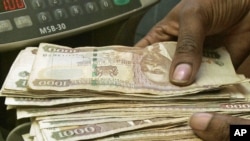A 2009 report by the Organization for Economic Cooperation and Development (OECD) estimates that illicit flows of cash from developing countries amounts to between $500 and $800 billion each year - funds that could otherwise be used to fund development in those countries. In sub-Saharan Africa, tax evasion is one of the main blocks to improving quality of life for the average person. Civil society groups met in Nairobi recently to discuss what capital flight looks like in Africa and what can be done to stop it.
Lawyer Attiya Waris, vice-chair of the British-based Tax Justice Network, explains that tax evasion by multinational companies accounts for two-thirds of sub-Saharan Africa’s estimated $480 billion per year capital flight.
She says trade mispricing, false invoicing and manipulation of tax policies are the most common methods.
“There are two sets of accounts usually; this is how people avoid and evade taxes," said Waris. "There is one set that companies have officially, and there is one set that they actually provide to government.
Kristina Froberg, policy and advocacy officer with the Swedish group Forum Syd, gives one example of how a company in Kenya set up a subsidiary in Switzerland. The Swiss subsidiary ordered a shipment of buckets from the company in Kenya at a price of $1,000 for each bucket.
“Now, the real price might have been half a dollar, and that is the price that the company in Kenya is going to get if they sell those buckets, and that is the price that they would have paid if they would have bought it somewhere else," said Froberg. "But the rest - 999.5 dollars - that they paid to Switzerland, that is just a way of transferring the profits, the money they have within the company in Kenya, to Switzerland.”
Lawyer Waris gives an example of how international companies that mine tanzanite - which can fetch as high as $725 per carat - have manipulated Tanzania’s tax holiday.
“Did you know that, 30 years ago, the Tanzanian government sold off the tanzanite concession for $20,000? Every 10 years, a new company buys the concession from another company, from the previous company, which means that that 10 years' tax holiday has been continuing for the past 30 years. The Tanzanian government has never received tax for tanzanite," said Waris.
The end result, say Waris and Froberg, is that African governments and developing countries around the world lose up to four times the budget that is needed to implement the Millennium Development Goals on health, education, water and sanitation, and other human development targets.
Lower tax revenues also increase African dependence on foreign aid.
Measures such as the World Bank’s Stolen Asset Recovery Initiative are attempting to stop the huge capital flight.
Froberg says that, on an international level, countries need to exchange information on capital flows and holders of suspicious bank accounts, especially in tax haven locations.
Waris says locally, activists should monitor corporate activities and publicize attempts at tax evasion. She gives the example of a report by Action Aid, which found that a huge, pan-African beer company was paying zero percent corporation tax in Africa.
“The result of it was that six African tax administrations are now doing a joint tax audit of SAB Miller in Africa," she said. "It is the first time in the history of the world that you have cooperation between six tax authorities.”
Waris urges civil society groups to continue such investigations and work with governments to crack down on tax evaders.
Activists Want Illicit Cash Flows From Africa Stopped




